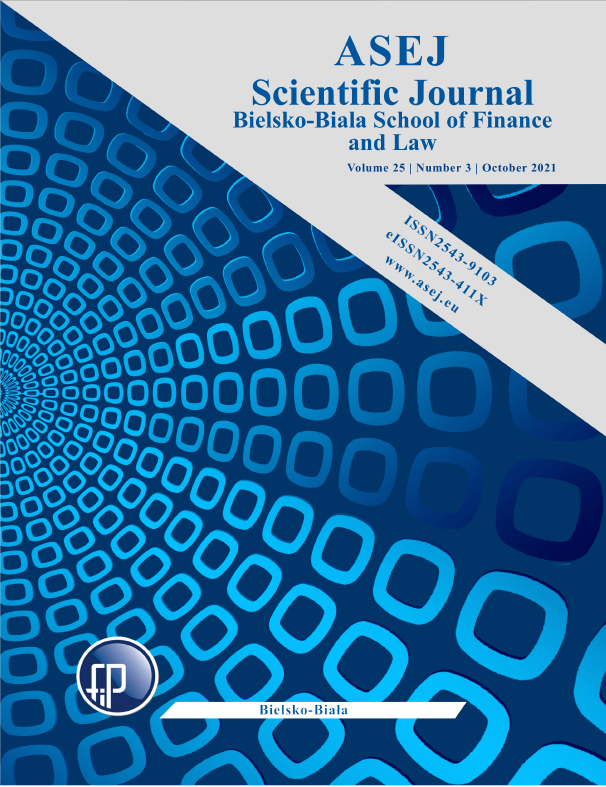Abstrakt
The modern economy goes beyond individual countries and becomes global, which increases the scale of economic abuse and ensures their organization. Such trends require scientific and practical rethinking of both the system of economic offenses and the ways and methods of their detection and overcoming.
The article explains an alternative approach in the study of economic offenses, which focuses on the deep processes of emergence and development of these trends in any economic formations. Methods and ways to combat this phenomenon in different countries according to the level of economic development are outlined and it is indicated that the fight against such crime is conducted as its manifestation. It is noted that the modeling of this phenomenon is based on the position of sustainability and completeness of the evolutionary development of society in relation to the economic system, so such models do not reveal the full depth of economic and legal norms and are derived from the violations themselves. The necessity of allocating economic offenses into a separate legislative norm in the domestic legislation is proved, which is confirmed by the conclusions of researches of foreign experts of law. A comparative analysis of economic offenses in Eastern Europe is presented.
Bibliografia
Achim, Monica Violeta, Sorin Nicolae Borlea, Lucian Găban, and Ionut, Constantin Cuceu (2018) Rethinking the shadow economy in terms of happiness. Evidence for the European Union Member States. Technological and Economic Development of Economy 24: 199–228
Ali, Mohammed A., Muhammad Ajmal Azad, Mario Parreno Centeno, Feng Hao, and Aad van Moorsel (2019) Consumer-facing technology fraud: Economics, attack methods and potential solutions. Future Generation Computer Systems 100: 408–27.
Andreas Buehn, Friedrich Schneider (2012) Size and Development of Tax Evasion in 38 OECD Coutries: What do we (not) know? Journal of Economics and Political Economy. Volume 3. Issue 1. DOI:10.1453/jepe.v3i1.634
Berghoff, Hartmut, Spiekermann, Uwe (2018) Shady business: On the history of white-collar crime. Business History Volume 60, 2018 - Issue 3: White Collar Crime. https://doi.org/10.1080/00076791.2018.1414735
Borlea Sorin, Achim Monica-Violeta, Babeş-Bolyai University, Monica Gabriela A. Miron (2017) Corruption, Shadow Economy and Economic Growth: An Empirical Survey Across the European Union Countries. Studia Universitatis „Vasile Goldis” Arad – Economics Series 27(2) DOI:10.1515/sues-2017-0006
Criminal Code OF Ukraine of September 1, 2001 https://www.legislationline.org/documents/action/popup/id/16257/preview
European Commission (2021) SME Performance Review https://ec.europa.eu/growth/smes/sme-strategy/performance-review_en
Grabosky P. (2001). ‘The prevention and control of economic crime’ in Corruption and Anti-corruption, edited by Peter Larmour and Nick Wolanin, 149-158. 1st ed. Australia, Canberra: Asia Pacific Press. http://press-files.anu.edu.au/downloads/press/p228301/pdf/ch091.pdf
Jay Pil Choi, Marcel Thum (2005) Corruption and the shadow economy. International Economic Review, Volume 46, Issue 3, 817-836
Lavruk, Vitalii V. et al. Verification of Social and Economic Determination of Crime in Ukraine. Journal of Advanced Research in Law and Economics, [S.l.], v. 9, n. 7, p. 2363-2371, nov. 2019. https://doi.org/10.14505//jarle.v9.7(37).20
NUMBEO (2020) https://www.numbeo.com/crime/rankings_by_country.jsp
Oksana Kvasha, Zoia Zahynei, Mykola Shapoval, Oleksii Kurylo, Viktor Nikitenko (2019) Corruptive abuses of senior public officials in the banking sphere as a determinant of the Ukrainian economy criminalization. Banks and Bank Systems, 14(2), 89-105. doi:10.21511/bbs.14(2).2019.08
Olena Kofanova, Yuliia Tereshchenkо, Roman Kutsyi, Nadiia Morhun, Oleg Gushchyn. (2019) Actual situation of computer crime in the credit and financial sphere of Ukraine (modern aspects). Banks and Bank system. Volume 14 2019, Issue #1, pp. 172-180. http://dx.doi.org/10.21511/bbs.14(1).2019.15
Prosecutor General’s Office of Ukraine https://old.gp.gov.ua/ua/stst2011.html?dir_id=113655&libid=100820&c=edit&_c=fo#
Report of Chief of the National Police of Ukraine about the results of the department's work in 2020 https://www.kmu.gov.ua/storage/app/sites/1/17-civik-2018/zvit2020/npu-zvit-2020.pdf
Transparency International (2021) http://cpi.ti-ukraine.org/#/
Yanovska, O., Vilhushynskyi, M., & Bitsai, A. (2020). Protection of property rights: side effects of economic crime investigation. Baltic Journal of Economic Studies, 6(4), 168-175.https://doi.org/10.30525/2256-0742/2020-6-4-168-1
Artykuły opublikowane w Zeszytach Naukowych Wyższej Szkoły Finansów i Prawa w Bielsku-Białej (tytuł równoległy: Scientific Journal czy Bielsko-Biała Szkoła Finansów i Prawa) są bezpłatne i udostępniane w trybie online (licencja Creative Commons Attribution CC-BY-NC 4.0). Wydawca nie ponosi odpowiedzialności za dostarczony materiał graficzny. Wersja drukowana to oryginalna wersja wydanego czasopisma. Odpowiedzialność za treść spoczywa na autorach, a nie na czasopiśmie.

